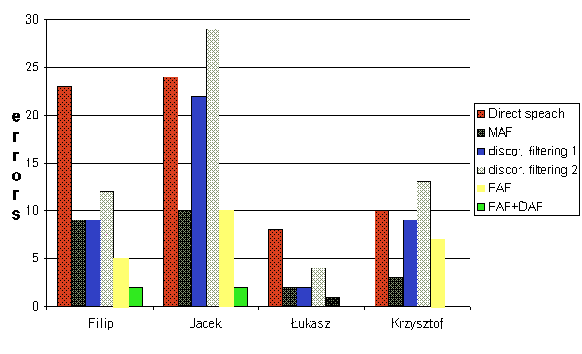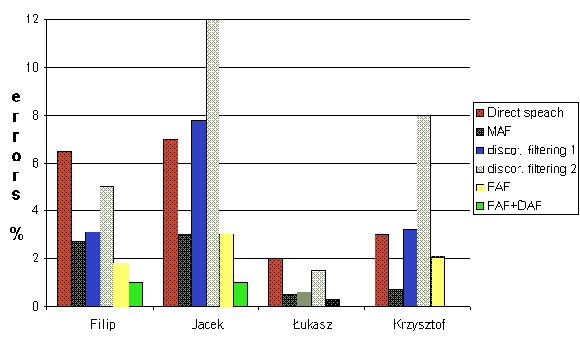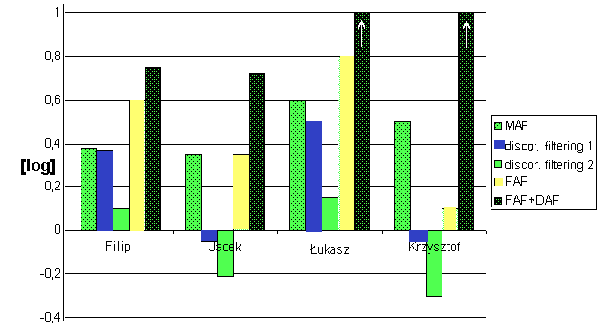|
Digital
Speech Aid to Decrease Stuttering
- Clinical Results and Patients' Reactions
Marek Roland-Mieszkowski, M.Sc., Ph.D., Digital Recordings This paper was presented in Munich , Germany, during the 1st World Congress on Fluency Disorders (August 8-12, 1994). It is published in the Proceedings of the Congress. Copyright 1989-2014, Digital Recordings. All Rights Reserved.
Introduction
New electronic aid / training device to reduce stuttering was
developed. Clinical tests on about 60 patients showed, that
the DSA (Digital Speech Aid) is effective in helping to
combat stuttering by itself or in combination with other
standard and non-standard methods [1]. The majority of
"Classical Stutterers" become more fluent when using this
device. Device is relaxing and non-disturbing. With DSA a
person can speak in any fashion and at any rate.
DSA is based on advanced DSdP (Digital Sound Processing)
technology using the latest electronic DSP technology. The
software developed for the device exploits new approach to
stuttering disorder. With DSA many stuttering people can speak
fluently (or more fluently) in any fashion and at any rate.
Results of the DSA testing supports authors' theory, that
stuttering is a physiological disorder, in most cases of a
neurological basis. Stutterers become nervous because they
stutter (not as believed by some, that they stutter since they
are nervous).
Authors decided to test DSA in real life situations, rather
than in artificial, laboratory-based. There are two major
reasons for this :
Very often results in the laboratory introduce unrealistic
environment, which does not predict at all if the device or
technique will be effective in other situations, where other
conditions such as : stress, multitasking, different auditory
conditions etc may play important role.
Effects of DSA are sometimes not noticable or significant at the
first trials. Our experiments indicate, that 4 to 6 weeks are
required to obtain full benefit of given type of DSdP
processing. In all clinical cases improvement was observed with
similar time scale. No decrease of effectiveness was observed as
predicted by some people familiar with our early research.
Above mentioned reasons require portable device to perform
experiments. This was the reason that DSA was reduced, despite
its' complexity to very small size. This allowed authors to
perform experiments investigating long-term effects. Also DSA
was designed with very powerful hardware, capable to implement
all existing algorithms and many new ones, which are currently
under investigation [3].
Currently, DSA is most effective in the case of "Classical
Stutterers" who consist about 80% - 90% of the stuttering
population. Significant improvement or total fluency is
observed in about 40% - 60% of "Classical Stutterers" during
the text reading. Rest of them also improve to various degrees.
Improvements were also observed in all situations : in the
office, at home, on the telephone, during public meetings,
presentations, good and bad days, etc. Improvement is
instant, however, we observe increase in effectiveness during
the first 2 - 6 weeks (this is consistent with other similar
observations and could be explained in author's opinion on the
bases of neural networks, which could be used as the model of
inner-working of the auditory system). After that it seems to
remain the same. In majority of cases there is a carryover
effect - person remains more fluent for 2 hours -> 2 weeks
after using DSA. Significant improvement in self-esteem and
self-confidence are observed. People like to use DSA and say
that it is relaxing. Many people also indicate, that they feel,
that they cannot stutter. Long term effects seem to support
authors' theory and expectations - DSA is still effective
(same level) after being used for 10 months.
First prototypes of DSA (II generation) were finished in May
1992. Some of the first clinical trials were very exciting and
the device met with good approval from the stuttering people.
Here are some of the remarks from this early study in Poland :
Testimony from speech pathologist : " ....I think that Digital
Speech Aid (DSA)is extremely effective in the elimination of
stuttering, even in cases of very severe stuttering.
....During my 30-years long practice as a speech pathologist, no
technique was as successful. I believe that we finally have the
green light for people who have till now problems with
elimination of stuttering ...We are waiting very anxiously for
DSA to appear on the market and become available for all
stuttering people......" Halina Stawikowska, Speech
Pathologist, June 04, 1992.
"....Speaking with DSA brought me big relief. I realized, that
I can also speak like normal person, at relatively fast rate.All
the sudden I got new surge of power.....This device helped me
also in the inter-personal contacts. I am not afraid anymore
!....It is fantastic to realize, that spoken word does not have
to be "bumpy". Thank you , thank you, thank you !!!....", Anna
Grudzien, 21 years old, June 05, 1992.
"....... Speaking with DSA eliminates prolongation of vowels,
speech becomes more fluent...Improvement is very good, much
better then with the DAF (Delayed Auditory Feedback). In my case
it was particularly noticeable in the German language, which I
am studying and in which I stutter much more often then in the
Polish language. While reading in German, with DSA I did not
stutter at all....", Jacek Szot, 24 years old, June 03, 1992.
"... I think, that use of DSA is relaxing.It is difficult to
stutter. I could speak fast without stuttering. Normally I speak
slow......", Prof. Antoni Stawikowski, Astrophysics, May 31,
1992.
".... With DSA one can speak fast ,with any chosen speed. I went
with this device to do shopping and I could speak very well.I am
sure,that if I would have this device my speech will
improve...", Lukasz Jaskolka, 15 years old, June 04, 1992.
"..... using DSA I feel, that I cannot stutter and I am not
nervous. On the beginning, I did not believe that I can stop to
stutter. After use of this device I got back my confidence...
Stuttering people must always speak slow, however I am not used
to do that.Using this device I can speak very fast.....", Emila
Davidek, 13 years old, June 04, 1992.
"........ when I tried this invention I started to feel
unconstrained, free, I am not stressed and I do not
stutter.This device is very good..", Marek Struk, 9 years old,
June 04, 1992.
Long-term effects were and are tested right now. The initial
results are very encouraging. It is expected that due to the
relaxing and reassuring effect of DSA, the base-line stuttering
level will decline (we observed this already in some cases). The
effectiveness of the device is expected to remain the same for
removal of the "natural level" of stuttering. In a sense DSA is
expected to work as a prosthetic device, similar to hearing aid.
It does not mean however, that it has to be worn all the time. It
can be only used several hours per day, in the most difficult
situations and as a backup (many of our subjects are using it in
this mode). Below are some remarks from some patients who did use
DSA for over period of 3 to 10 months :
"....I am very happy with DSA. Used it day to day and my speech
has improved 80 %. I have used DSA to speak at approx. twenty
(20) meetings as I am president of a Legion in Dartmouth,
N.S......I recommend DSA 100%....." John Dunphy, Dartmouth,
Nova Scotia, Canada, November 18, 1993.
"...my experience with DSA for past 7 months has been
good....In past years talking on the phone was my reason to be
nervous to speak to people. With DSA I now find it to be no
problem to answer a phone and have a normal conversation. I
recommend DSA for anyone with a speech stoppage and
stuttering." John Dunphy, Dartmouth, Nova Scotia, Canada, March
25, 1994.
"Overall the device has been very helpful.....I have improved
the most on the telephone; I would often avoid words, but with
the device I hardly stutter....I am not as apprehensive about
my stuttering as before and my speech has improved a great
deal. I have also noticed an increase in my self-esteem since
wearing the device.....I feel more confident in speaking
situations and do not avoid words.... For the first few weeks
(3-4), my speech was improving at a steady rate. At about one
month, my level of fluency seemed to level off and I have
maintained the same level of fluency since that time...." 25
years old female stutterer, Halifax, Nova Scotia, Canada
November 18, 1993.
"..Over the course of a few months, I became very comfortable
with the speech device (DSA). ...I have less apprehension with
"feared words" and stutter quite a bit less than before using
the device. My confidence in speaking has improved over the
time I used the device and the "carry-over" time has also
increased. My fluent speech will last sometimes half a day
without the device." 25 years old female stutterer, Halifax,
Nova Scotia, Canada, December 19, 1993.
"The DSA machine has really opened up a new world for me. It
has provided me with a new sense of freedom now, by allowing me
to speak without fear, of so many things. The most significant
revelation is being able to use the telephone and call people
and places I haven't been able to.... The DSA has given me so
much comfort in my speech and day to day life by gently
allowing me to speak and say words that I have avoided for
many, many years. It is truly a great invention and a miracle
for someone like myself who felt I would spent the rest of my
life hiding from many situations." Lori Paruch, Halifax, Nova
Scotia, Canada, January 14, 1994.
"When I first began to use the DSA I noticed a dramatic
increase in my fluency when speaking especially on the
phone.....It has been so wonderful to have the freedom of not
being afraid to use the phone, to call to make appointments
etc.....My life has changed now since I have used DSA.....it is
a wonderful machine to use." Lori Paruch, Halifax, Nova Scotia,
Canada, April 04, 1994.
As the elaborated prototypes of the DSA are implementing various
algorithms for the modification of the auditory feedback loop,
thus some studies were carried out to enable the comparison of
the effectiveness of individual methods. The DSA prototypes were
implementing masking noise (MAF), delayed auditory feedback
(DAF), frequency altered feedback (FAF) [4,5] and digital
discorrelation filtering - the algorithm elaborated by the
authors [3] and various combinations of the above algorithms.
Results of an exemplary testing session are presented in the Tab.
1 and in Fig. 1,2,3.
DSA was designed with very powerful hardware, capable to
implement all existing algorithms and many new ones, which are
currently under investigation The elaborated prototypes of the
DSA are provided with 256 settings to be selected by the
operator or by the user. Currently, DSA is most effective in
the case of "Classical Stutterers" who consist about 80% - 90%
of the stuttering population. Significant improvement or total
fluency is observed in about 40% - 60% of "Classical
Stutterers" particularly during the text reading. Rest of them
also improve to various degrees. Long term effects seem to
support authors' theory and expectations - DSA is still
effective (same level) after being used for 10 months.
Consequently, the authors are of the opinion that the progress
in modern digital signal processing technology may cause
considerable impact to the reduction of stuttering.
Terms of Use | Return Policy | Privacy Policy
No part of the information provided on this www page may be reproduced for any purpose, in any form, without prior written approval.
|



